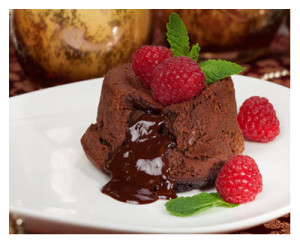Here’s the problem with hyperbole. When using the very concept of excess to excess, comparisons lose their steam.
 There is no “great” when everything is great; there is no “tremendous” when everything is tremendous; even “beautiful” becomes status quo, and “most” beautiful, next to meaningless. Moreover, the subjective nature of these superlatives adds to their ineffectiveness.
There is no “great” when everything is great; there is no “tremendous” when everything is tremendous; even “beautiful” becomes status quo, and “most” beautiful, next to meaningless. Moreover, the subjective nature of these superlatives adds to their ineffectiveness.
And no, I’m not solely speaking of Trumpist tones, though certainly “the most beautiful piece of chocolate cake you’ve ever seen” struck me as irksome to the… dare I say it… max.
When overstatement, embellishment, and exaggeration abound, I can’t help but feel that I’m being sold a bill of goods. And the fact is, I feel that frequently these days. We seem to be living in hyperbolic times — hyperbole in extremis — or is that, too, too too over the top?
Hyperbole Headache?
Merriam-Webster explains hyperbole in an ironically underwhelming fashion:
language that describes something as better or worse than it really is
That definition is a serious disappointment! Not a disaster, not a catastrophe, but lacking in… well… evocative richesse.
Turning to a more painterly definition, I prefer this take on the term from Literary Devices:
… the use of obvious and deliberate exaggeration. Hyperbolic statements are often extravagant and not meant to be taken literally. These statements are used to create a strong impression and add emphasis.
Oh, so much better, don’t you think? Of course most of us don’t take overblown statements “literally.” But what about those who do?
Good, Better, Best… Bestest???
I’ve often found comparisons to be counterproductive. Likewise, rankings. Though both are helpful in specific circumstances, haven’t we run ranking-and-rating rampant in recent years?
Whether we’re selecting the hottest guys or most gorgeous women, the “best people” for government appointments much less the best cake… surely we understand that these are expressions of a momentary (and often fleeting) impression. In their overuse (overindulgence?), we only succeed in undercutting the very power of our loftiest praise.
 If hyperbole is to achieve its objective, it’s about emphasis, remember? And if everything is emphasized, then nothing is emphasized, and magnificent and marvelous and miraculous and monumental and “most” (most of all?) ultimately lose their luster.
If hyperbole is to achieve its objective, it’s about emphasis, remember? And if everything is emphasized, then nothing is emphasized, and magnificent and marvelous and miraculous and monumental and “most” (most of all?) ultimately lose their luster.
Now, I don’t mean to downplay the pleasure of a sonorous series of synonyms rolling off the tongue; layering language is not unlike layering flavors in our cuisine. All the more reason to trade in “greatest” for “unrivaled” or “unsurpassed” or “extraordinary.” (“Unprecedented” already appears too often for my taste, however accurate the term.)
Wouldn’t it be better to tame our tendency to raise every object or observation to spectacular heights (or plunged to elegiac depths), lest we lose the pleasure of a word’s distinctive edge?
Compare and Contrast?
I realize that overusing “most” and “best” and “greatest” and similar qualifiers suggesting that size matters — oversize matters, really — becomes a verbal quirk. It’s certainly not the “worst” thing in the world, nor necessarily the laziest language trap to fall into. And don’t we all develop phrasing foibles we rarely notice unless someone points them out?
Only the listener (or reader) may take note, that notice ranging from bemused to irritated and anything in between. I suffer my own handful of verbal tics (as an acquaintance once informed me); I was entirely unaware of the extent to which certain expressions peppered my prose, and these days I try my damnedest — (too much?) — to filter them out.
In the land of comparatives or superlatives, however, I work to minimize emphasis (as oxymoronic as that may sound), and I hope I utilize comparisons only where they are effective and knowing full well they are not absolute. My “best” is not your best; my “most beautiful” is not your “most beautiful,” and likewise my “worst day ever.”
Incidentally, while I don’t find the “best ever” to be as tedious as “worst ever” — I discount the former and find the latter leaning toward crying wolf — would it kill us to remember that we are judged by language? More importantly, that words are tools, that specificity paints a picture, that clarity offers more bang for the buck?
Worst of the Worst of the Worst? Let’s See…
 Curious to see if there were bigger-than-big, grander-than-grand, GARGANTUAN examples of hyperbole available, I googled “the most egregious example of hyperbole” and… lo and behold… got nearly a direct hit! However, I found myself sorely disappointed by the resulting hyperbolic example. Crestfallen, even.
Curious to see if there were bigger-than-big, grander-than-grand, GARGANTUAN examples of hyperbole available, I googled “the most egregious example of hyperbole” and… lo and behold… got nearly a direct hit! However, I found myself sorely disappointed by the resulting hyperbolic example. Crestfallen, even.
And a little bit pissed.
This is yet another aftereffect of being set up by uber-ultra-super-stupendous expectations; the reality is generally less than stellar.
A more significant find in my cursory cruising was this book entitled “Caring for Words in a Culture of Lies” written by Marilyn McEntyre. While I am only able to access sample pages via Amazon, I offer you this:
Like any other life-sustaining resource, language can be depleted, polluted, contaminated, eroded, and filled with artificial stimulants. Like any other resource, it needs the protection of those who recognize its value and commit themselves to good stewardship…
Artificial stimulants, indeed. Hyperbole (at its best, or is it at its worst?) could well be termed as such, certainly when consistently used to prop up anything and everything with a vague and vapid veil of inexactitude. As it is, the hyperbole we are currently subjected to rings true as “faux” and falls flat as stimulating.
Whatever happened to the art of “telling it like it is?”
You May Also Enjoy
I studied Journalism in college and was raised by a mom who was a strict grammarian- she could spend an hour outlining the use of lay down vs lie down-
I absorbed it all and learned that the exact words we use truly matter.
After marketing and advertising became more prevalent and tested for impact-it’s harder to know what to believe- we can’t escape from ads before we watch movies, product placement, online ads in our news websites, even sign flippers on the corners with ads we see every day while driving.
I’ve come to follow the adage, “Less is More’ when it comes to choosing words in my writing.
How cool to be raised by a grammarian, Nancy Kay! (Less is definitely more at times, yes.)
Absolutely best article on hyperbole ever! My teaching buddy used to say to his students, “I’ve told you a million times, stop exaggerating.” Ha. The internet abounds with hyperbole…and that’s not an exaggeration. But the click bait articles which purport to leave the reader “breathless” bug me the most. Those, and the fashion blogs which refer to an outfit of cut-off denims and a tee shirt as “insanely chic.”
Sigh. Words matter.
Oh, you make me laugh, Sue! “Best ever” indeed.
On that note, I’m going to slip into my insanely chic little tee and jeans. 🙂
“I’ve told you a million times, stop exaggerating.” Sue, that is a funny example! It made me laugh. It also reminded me of a time when my oldest brother would do his story telling and after listening I would say to mother, “That’s not true!” Mother would say, “He embellishes.” Needless to say, he did not become the journalist in our family, but the attorney instead.
I suppose journalists are the people that we aspire to “telling it like it is.” And, sometimes the insanely chic. ?
You just made me laugh, TD!
?
How I miss Charles Kuralt! Do you remember him? Simple…powerful language!
Yes, I do remember him, Angela! Some people have such a gift for clarity, while still able to paint a picture.
In one of his books he reported a succinct message that caught his eye. Spotted in magic marker on a men’s restroom condom dispenser in the middle of the heartland – “This gum tastes like rubber!”
I just received an email from AT&T – “Paperless billing can be Amazing!”.
I’m trying to imagine the life so dull that it would be amazed by paperless billing….
And Nancy Kay, I appreciate your comment, as I had a similar upbringing but only dimly recognized how unusual it was. My mother was an English teacher. I don’t know if she would have gone an hour on “lay down” vs “lie down” but I do know she would go at least twenty minutes, as we’ve had that very discussion. I was also casually remonstrated for errors and sloppiness. I can’t claim to uphold her standards, but I’m sure some of it endures.
Very funny, Robert, “amazed by paperless billing….” ?